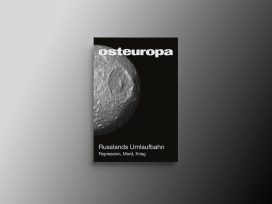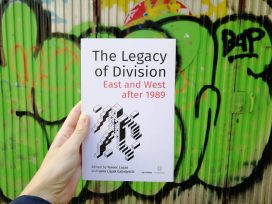Shortly after the fall of Yanukovych’s regime in late February 2014, I got a call from a Czech journalist asking for a brief comment. Her first question was fully in line with the Russian coverage of the events: ‘Was it a revolution in Kyiv or a coup d’etat?’
I lost my nerves and responded in kind: ‘And what was there in Prague back in 1989? Revolution or coup d’etat?’
She was apparently shocked and perhaps insulted by my impertinent lip. How could I dare such a comparison? How could I equate their great, spectacular Velvet Revolution, glorified in literature and film, with a third-world mutiny of fascist gangs against a legitimately elected president?
‘Of course, it was a revolution!’ she exclaimed proudly. ‘The Velvet Revolution!’
I had to be duly ashamed for my ignorance bordering arrogance.
She may have never read Milan Kundera’s article on the Occident kidnappé but she sounded like she perfectly knew where the West, i.e., ‘true’ Europe ends, where legitimate freedom-loving revolutions could happen and where they could not – and should not. She sprang from the same cultural milieu and exemplified the same mental matrix; she held the same dual complex of inferiority and superiority: the feeling of being undervalued and betrayed by the West and the feeling of a similar, if not greater contempt for the East.
This made me read the classical Milan Kundera essay from a different angle: not so much as a passionate plea for freedom and ‘return to Europe’, away from the Soviet dominance (for this goal had been actually accomplished), but as an attempt to achieve that goal at the cost of implicitly excluding all other prisoners of the communist camp as less worthy, less ‘European’, less striving for freedom and probably less deserving it.
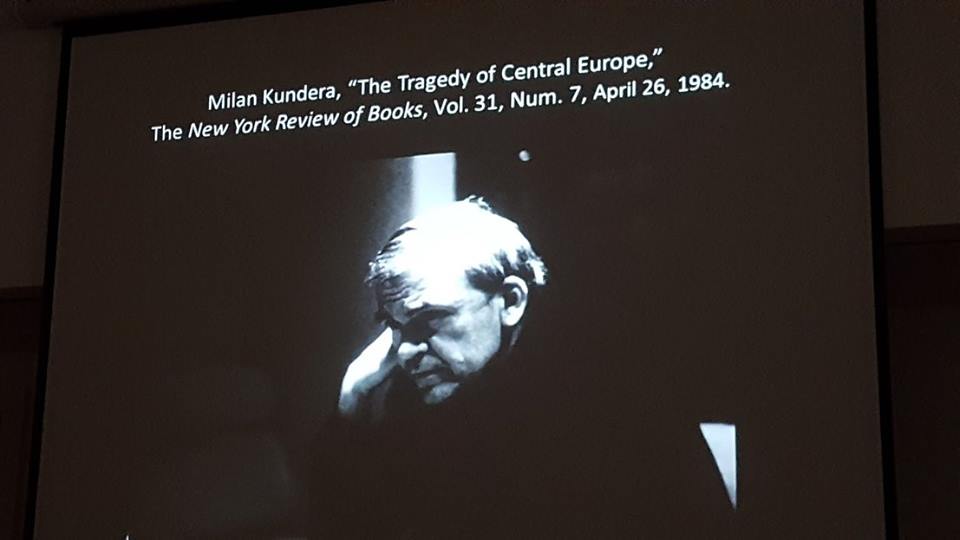
Milan Kundera’s essay The Tragedy of Central Europe, originally published in French in 1984 Photo via Fomoso.
This very legacy of Kundera’s exclusivist concept came to the fore in the past decades, discernable in both public attitudes to the ‘East’ and specific state policies (or lack thereof). It is certainly not Milan Kundera’s crime, since he merely reproduced (but, regretfully, did not question) the traditional, long-existing structures of thought and argumentation. Paradoxically, his text appeared to be a part of the same discursive traditions against which he rebelled – the tradition of ‘Philosophic Geography’ and the various policies it has inspired and legitimized.
Eastern Europe within the tenets of ‘Philosophic Geography’
Larry Wolff, who borrowed the term from the 18th-century John Ledyard’s travelogue, defined it as a geography subordinated to specific philosophical values (i.e. ideological preferences). This was a kind of geography that made chancellor Metternich proclaim that Asia begins at the end of Landstrasse, that is, in the south-eastern outskirts of 19th century Vienna.
And nowadays, it still makes his compatriots believe that the Ukrainian border is much further away from Vienna than the Swiss border (even though it is a hundred kilometres closer), or that Kraków and Budapest are located closer to Moscow than to Paris. ‘Philosophic Geography’ played an important and often disastrous role for eastern Europeans, especially at the end of the Second World War and its aftermath.
The Yalta conference, held in February 1945 in Crimea, was emblematic in this regard – not only because it determined (or legitimized, at least) the ceding of eastern Europe to Stalin’s butchers. It also, in an equally quirky way, spared Greece from the same ordeal, insofar as it was recognized as the ‘cradle of European civilization’, the land of ‘immortal glories’, in Churchill’s words, – contrary to all other, apparently unremarkable and therefore disposable nations of the East.
It was fully in line with ‘Philosophic Geography’, so the real continuity of modern Greece and Greeks with that homonymous ‘cradle’ and its vaunted ‘glories’ did not matter. ‘Philosophic Geography’, as Larry Wolff sarcastically remarked on some other occasion, ‘was a free-spirited sport, so much that it was not actually necessary to travel to eastern Europe in order to participate in its intellectual discovery’.
Edward Said, in his classical book, defined orientalism as ‘a Western style for dominating, restructuring, and having authority over the Orient’. Larry Wolff followed the suit when defining western ‘knowledge’ of eastern Europe as a ‘style of intellectual mastery, integrating knowledge and power, perpetuating domination and subordination. As in the case of the Orient, so also with Eastern Europe, intellectual discovery and mastery could not be entirely separated from the possibility of real conquest’.
It was not only Napoleon who employed this knowledge, and not only Hitler and Mussolini who brought some tenets of ‘Philosophic Geography’ to their extremes. It was also, ironically, their opponents and nemeses, Churchill and Roosevelt, who employed that peculiar ‘knowledge’ to justify the takeover of eastern Europe by their indispensable Soviet ally.
Who decides what’s possible
In many regards, the experience of east Europeans with their western brethren has been very traumatic. It was overloaded with false expectations, bitter resentments, and poorly hidden psychological complexes – of inferiority, betrayal, abandonment, cheating, and underappreciation. They could not help feeling the gap between the lofty ideals proclaimed by the western democracies, and their practical policies, driven much less by ideals, and much more by pragmatically calculated national interests.
It was apparent long before the disgraceful attempt to accommodate Stalin in Yalta (1945) at the cost of Poland and other east European nations, or to appease Hitler in Munich (1938) at the cost of Czechoslovakia. Two decades earlier, the British prime minister David Lloyd-George disclosed his principles with a charming imperial candidness, when declaring the will to trade not only with Bolsheviks but ‘even with cannibals’.
And in 1933, at the height of the genocidal famine masterminded by Bolsheviks in Ukraine, the British Foreign Office, fully in line with those principles, reported secretly:
The truth of the matter is, of course, that we have a certain amount of information about famine conditions in the south of Russia [sic], similar to that which had appeared in the press… We do not want to make it public, however, because the Soviet government would resent it and our relations with them would be prejudiced.
This does not mean that the gap between noble ideals and the mundane reality of geopolitics could be completely bridged, and the conflict between normative values and practical interests could be easily solved.
Hans Morgenthau, a classic of the ‘realist’ school in modern political thought, argued that the ‘ethics in abstract’ is not applicable in the field. The morality of political decisions should not be judged by intentions but by results. Essentially, this is anything but a recast of the old dictum by Karl von Clausewitz on politics being the art of the possible.
Making excuses
There is certainly some rationale in this pragmatic approach but there is also a dangerous loophole in a seemingly logical argumentation that allows to (mis)represent any immoral steps as pragmatic, reasonably calculated and only feasible.
Nobody could expect NATO to bomb Moscow to stop the Russian genocide in Chechnya – as they bombed Belgrade to rescue the Kosovars. And nobody wished the West to liberate the annexed Tibet or Crimea as they liberated Kuwait after Saddam Hussein had ‘re-unified’ it with Iraq.
Still, short of military invasion, there are many other instruments in international politics that could be employed – but usually are not. And this acquiescence reflects not so much the vaunted pragmatism of western leaders as their trivial cynicism and lack of integrity.
All this put east Europeans in an awkward position. On the one hand, they had good reasons to feel betrayed by the West, belittled and alienated. This could naturally result, as elsewhere on the globe, in zealous anti-westernism, nationalism, xenophobia, isolationism, and autarchy. But, on the other hand, this political stance and ideological niche had been already occupied by the Soviets.
Very few independently-minded Easterners wished to identify themselves with the hated regime and to join its anti-western crusade. However hard their feelings may have been against the seemingly haughty and arrogant West, they had to choose it as the lesser of two evils. They were, in a sense, ‘westernizers by default’.
Their ambivalent hate-love attitude toward the western brethren was well articulated by east European intellectuals in the 1980s when they invented a peculiar concept of ‘central eastern Europe’ as a powerful argument for their ‘European belonging’ and a passionate claim for ‘return to Europe’, to ‘normalcy’.
For westerners, it was a timely reminder that the region could be more than ‘footnotes to Sovietology’, as Timothy Garton Ash aptly put it, that ‘East Berlin, Prague, and Budapest are not quite in the same position as Kiev or Vladivostok’ and that ‘Siberia does not begin at Checkpoint Charlie’.
(Whether Siberia really begins in Kyiv and whether Ukraine’s capital is exactly ‘in the same position as Vladivostok’ was not discussed at the time, with some dramatic consequences apparent today).
Despite the semantic similarity to the earlier nineteenth-century term Mitteleuropa, ‘central Europe’ was completely devoid of pan-Germanic ideological connotations. On the contrary, it asserted the uniqueness and sovereignty of endangered small nations squeezed, for the latest part of their history, between Russia and Germany.
Of many texts that elaborated on the topic, Milan Kundera’s essay The Tragedy of Central Europe (1984) gained probably the highest prominence. Published originally in French, it was translated into a few dozen languages, including the most quoted English version in the New York Review of Books.
Kundera’s resentment
The message Kundera conveyed to the western audience in his essay was twofold. On the one side, he provided evidence of the region’s traditional, centuries-long engagement in European cultural life and substantial contribution to the common heritage.
The region, he wrote, was neither different nor separate from the West, but integral and indivisible. It was actually a part of the West, unjustly cut off from its illustrious body and ‘stolen’, ‘kidnapped’ (as the French title implied) by the sinister, essentially anti-European Russia. This does not make yet the region indisputably ‘eastern’.
For central Europe, in Kundera’s poetical narrative, is not a state, but a culture or a fate:
Its borders are imaginary and must be drawn and redrawn with each new historical situation. Central Europe therefore cannot be defined and determined by political frontiers … but by the great common situations that reassemble peoples, regroup them in ever new ways along the imaginary and ever-changing boundaries that mark a realm inhabited by the same memories, the same problems and conflicts, the same common tradition.
The second of Kundera’s argument ran against the West’s parochial and myopic view of the region as allegedly ‘eastern’ and therefore different and rather legitimately relinquished into the Soviet sphere of influence. This could not have happened, he argued, if western Europe itself was not ‘in the process of losing its own cultural identity’, if it still understood ‘its unity as a cultural unity’, rather than seeing in central Europe ‘nothing but a political regime’, and downgrading thereby one of the crucial parts of its culture and history to the empty political construct of ‘eastern Europe’.
Kundera’s article gained high appraisal and became programmatic for a whole generation of central east European intellectuals. It explicitly legitimized their sublime ‘European dream’ and coveted ‘return to normalcy’, implicitly delegitimizing their forcible inclusion into the Soviet realm and political subordination to that presumably non-European power.
Yet, the article also encountered severe criticism from various quarters. One of the first and most renowned responses came from the fellow émigré writer Joseph Brodsky who correctly pointed out Kundera’s ‘reductionist approach’, excessive generalizations, ‘limited or lopsided’ notion of European civilization, and misuse of handy dichotomies like East-West, feeling-reason, them-us and so forth.
The sad truth about him (and many of his east European brethren) is that this extraordinary writer has fallen an unwitting victim to the geopolitical certitude of his fate – the concept of an East-West divide … His sense of geography is conditioned by his sense of history.
Brodsky made many other good points in the article. In particular, he aptly remarked that the modern police state was a product of the French Enlightenment, that Das Kapital was translated into Russian from German, and that the Soviet version of communism (so loathed by Kundera) was as much a product of western rationalism as of eastern emotional radicalism.
He duly reminded that the communist totalitarianism was not only exported by Russia, but it also encountered there a very strong resistance – much stronger (here Brodsky goes ad personam) than in Kundera’s own country, either in 1948 or 1968; that foreign tanks invaded Prague not only from the hated East but also from the celebrated West; and that the last European war was ‘by and large western civilization’s civil war’.
Despite its stylistic prowess and shrewd observations, Brodsky’s article did not attain the prominence of Kundera’s text – partly because of its personal wisecracks against his opponent, and partly because it focused too much on the defence of Dostoyevsky and Russia, appearing perhaps too partisan.
But the main flaw of Brodsky’s essay was, as the Bosnian writer Adin Ljuca contends, the same as Kundera’s: both failed to find their way out of ‘handy dichotomies’ and overcome them; both remained at the level of a ‘bad ping-pong match’ (‘a traumatized Czech’ versus ‘a deep-souled Russian’ who, despite everything, seeks an alibi for himself) – ‘as if Evil originated in the East or in the West’, rather than in each person’s words and deeds, choice and responsibility.
The English version of this article was originally published in the Aspen Review no. 1, 2021 and is republished by Eurozine with their consent.
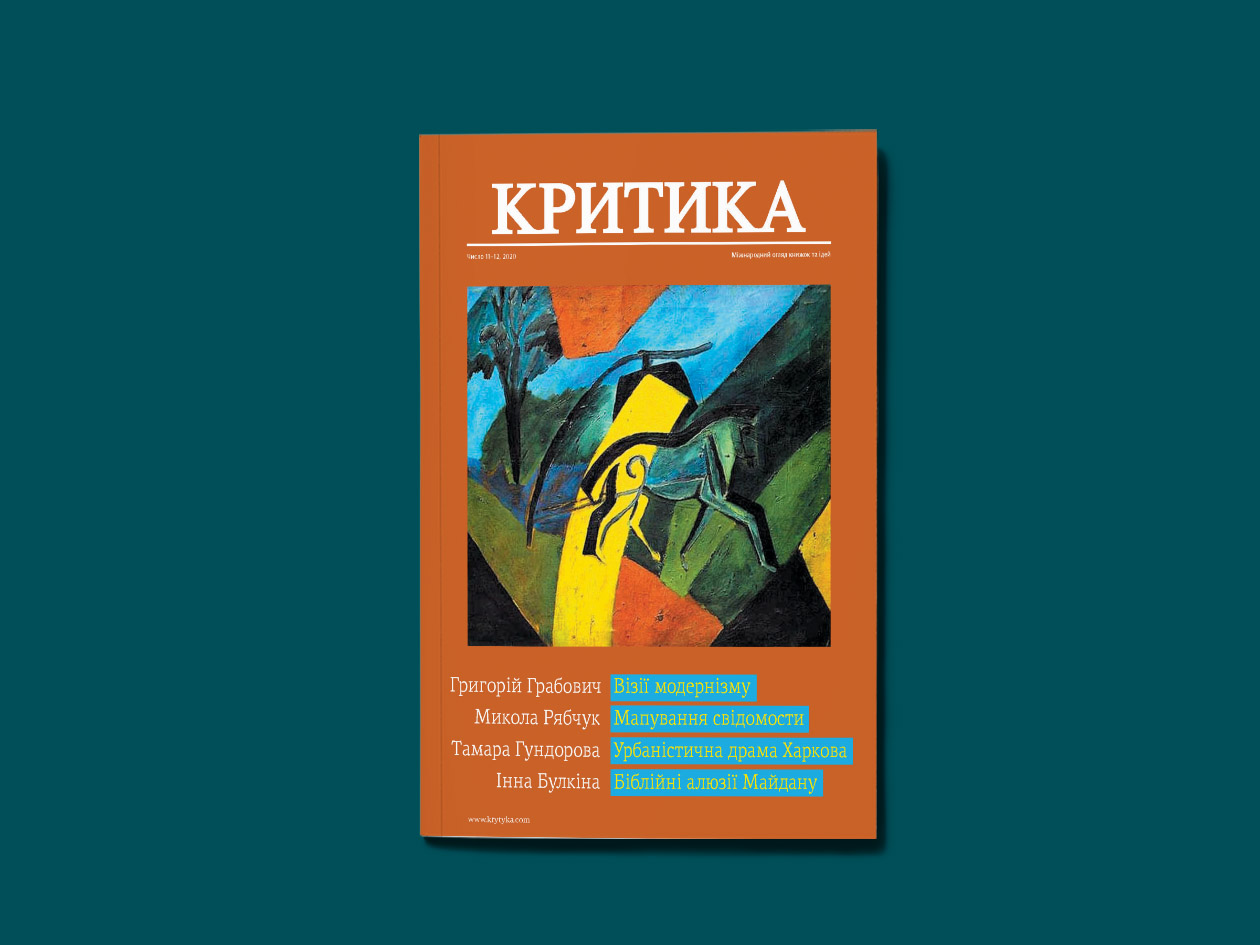
This article was first published by Eurozine’s Ukrainian partner journal, Krytyka. Their 11-12/2020 issue looks into literature of the Maidan revolution, Soviet orientalism and more. Read our review here.
Discursively overblown
The problem is barely new as it had been already raised in 1968–1969, in the polemical exchange between Kundera and Václav Havel, specifically in the latter’s response to Kundera’s article ‘The Czech Lot’, published a few months after the Soviet invasion of Czechoslovakia.
Havel, with his preeminent moral sensitivity, noticed the threat of relativism, fatalism, and collective irresponsibility that resulted from assigning ‘geographic position’ with a discursively overblown role. Ironically, fifteen years later, the same essentialized and oversimplified ‘geographic’ argument would be used to acquire a special status of the ‘stolen West’ for a few privileged nations deemed central European and therefore exceptional, different from all other captive nations, by the very fact of their historical and geographical provenance.
Kundera, in fact, succumbed to the same playbook of ‘Philosophic Geography’ that he seemed to vehemently renounce in its Soviet, ‘geopolitical’ reincarnation. In both its editions, the eighteenth-century exclusivist pathos manifestly prevailed.
This made even sympathizers of the idea express some cautious criticism of Kundera’s simplifications and his manipulative use of facts and terms. Timothy Garton Ash described in particular how Kundera and his followers opt for the term ‘eastern Europe’ or ‘east European’ when the context is neutral or negative, but prefer to speak on the ‘central’ or ‘east central Europe’ when the statement is ‘invariably positive, affirmative, or downright sentimental’.
He reminded assiduously that not only Kafka, Bartók and Hašek were ‘central Europeans’ but Adolf Hitler as well; that nationalism and racism are as part of the local legacy as multiculturalism and tolerance; and that a ‘super-bureaucratic statism and formalistic legalism taken to absurd (and sometimes already inhuman) extremes’ had been the region’s particular features long before the advance of Soviet communism.
He asked waywardly:
Aren’t there specifically Central European traditions, which at least facilitated the establishment of communist regimes in Hungary and Czechoslovakia, and traditions which those regimes signally carry forward to this day?
Ten years later, Tony Judt reiterated the same criticism even more forcefully:
To suppose that this part of the Continent was once a near-paradise of cultural, ethnic, and linguistic multiplicity and compatibility, producing untold cultural and intellectual riches, has been part of the western image in recent years. Yet … in truth central Europe, from the Battle of the White Mountain (1620) down to the present, is a region of enduring ethnic and religious intolerance, marked by bitter quarrels, murderous wars, and frequent slaughter on a scale ranging from pogrom to genocide. Western Europe was not always much better, of course, but on the whole, it has been luckier, which is almost as good.
The true tragedy of eastern Europe
Perhaps the best account of east European woes and flops, underperforming and lagging behind, was provided by the Hungarian émigré intellectual György Schöpflin in his seminal 1991 article on the political traditions of eastern Europe. Drawing largely on the concepts of Jenő Szűcs, he formulated certain caveats that partly absolved him from the sin of essentialism.
He spoke not about primordial entities called ‘East’ and ‘West’ but about two different, historically informed political traditions that variously correlate but never thoroughly coincide, with different specific states stretching from the west of Europe (France and Britain) to its ‘far east’ represented by Russia.
These two traditions, as he contends, fundamentally differ in conception, generation, legitimation and exercise of political power. The western tradition evolved from the initial division of power between secular and church authorities, largely facilitated by the supranational character of the Catholic church. This introduced something absent in non-western traditions: the idea of limitation of power by formal rules (starting from the Magna Carta, the English precursor of modern constitutions), and the idea of contractual relations between rulers and subjects (something unfathomable in the Ottoman, Russian and other ‘eastern’ empires).
All this was either missing – as in eastern and south-eastern Europe, where the fusion of the Orthodox Church with state authorities left little room for any autonomous social actors – or was rather weak: as in central eastern Europe. Here, the relative weakness of the Prussian and Austrian empires handicapped development of the subordinate nations, even though the local Catholic and Protestant Churches were not as etatized, as was the case in Byzantium and Muscovy, or eventually Russia. Eastern Europe, in sum, ‘constituted a transitional zone between the western tradition of the division of power and the eastern tradition of concentration of power’.
Eastern European nations entered a period of national independence after the First World War with a common agenda of catching up with modernization. All of them lagged behind their western counterparts and shared common problems inherited from the former empires they used to belong to. At the same time, they differed substantially from each other in terms of their development, with the most conspicuous difference being determined by their past belonging to either more advanced Austrian and German empires (Catholic/Protestant realm) or more backward Russian and Ottoman empires (Orthodox or Muslim area). Central eastern Europe was definitely the closest in its development to the West, so the myth of the ‘kidnapped Europe’ is not completely off-base.
Schöpflin does not discuss this issue but implies, rather reasonably, that the Soviet and, more generally, Communist dominance was not the only and probably not the main reason for the region’s backwardness.
Deeper historical and structural factors had been at play and, as the author appropriately remarks, ‘the development of Greece (that was not “liberated” by the Soviets) in the first two to three decades after the war is instructive in this respect’. One may perhaps extend this line of argumentation by saying that even in 1990 or 2020 Greece would still have looked more like in the 1960s or 1970s, had it not been taken under the guidance and guardianship of the European Community.
Rebranding the East
The same line of argumentation implies that geographic-cum-geopolitical labelling may play a crucial role in some nations’ destinies. The only reason that Greece looked, by the 1990s, more advanced than Czechoslovakia was that it was recognized (arbitrarily) as ‘western’ and forcefully pulled into the western European political and economic orbit, while Czechoslovakia (and many more nations) were designated as ‘eastern’ and left in the cold.
This makes ‘Easterners’ understandably wary of this kind of labelling and determined to distance as much as possible from a dangerous geographic (‘philosophical-geographic’) zone that bodes them no good but, most likely, exclusion, abandonment and betrayal.
‘Central Europe’ is a discursive life-belt that gives some nations a chance to be rescued under the security of the western flagship. But it fits only a few of them – Czechs, Hungarians, partly Slovaks who also hate to be ‘eastern Europeans’, and perhaps Slovenes who loathe being part of the ‘Balkans’.
Others need to extend the term hyphenating it into ‘central eastern Europe’ like Poles or Romanians, or invent something else like ‘Nordic’ for the Balts, or ‘Mediterranean’ for the Croats, Montenegrins and perhaps Albanians. Bulgarians have no choice because the very term Balkans stems from the name of the mountains on their territory. And Ukrainians, Moldovans and Belarusians have to either go to ‘Eurasia’ (the new code-name for Russia and its truncated ‘sphere of legitimate interests’) or become a ‘new eastern Europe’ since the ‘old’ eastern Europe disappeared.
John-Paul Himka, a renowned Canadian historian, has quipped at this ‘new geography’ of the continent that has a West, a Center, but no East. ‘Foucault would have loved this geographical gaping wound’, he remarked sarcastically, referring to the penchant of the French philosopher to analyze discursive twists and tricks, and ‘to determine the power relations that constitute organization and accumulation of discourses we consider to be knowledge’. Such an analysis would definitely reveal, as Himka implies, that the ‘division into regions is not a value- or narrative-neutral act’, regionalization has a strong ‘political meaning’, and any naming/renaming indicates ‘repositioning and reconfiguration of power relations’.
From this point of view, the concept of ‘central Europe’ had been originally conceived as a discursive attempt of the ‘powerless’ nations subjugated by the Soviets to acquire some power by identifying themselves symbolically with the West and persuading the West to reciprocate. It was an attempt to employ the soft power of ‘Europe’ to counterbalance the hard power of Moscow.
It is not surprising that the concept gained broad popularity inasmuch as it was perceived first and foremost as a liberating, ‘emancipatory’ project, ‘a metaphor of protest’. Little if any attention was paid at the time to its peculiar spatialization and potential exclusiveness.
Changing uses after the Soviet collapse
The situation has changed dramatically in 1989-1991, after the collapse of the Soviet empire, when the concept of ‘central Europe’ ceased to be a tool of symbolic emancipation in the utopian realm of culture and became a tool of discursive lobbying in the callous field of practical politics.
As the fight for inclusion into the privileged western clubs of the EU and NATO began, the other, exclusivist side of the concept came to the fore: ‘the lopping off from the old eastern Europe of its eastern portions, now included in “The former Soviet Union” or “Eurasia”, and of its southern portions, now “southeastern Europe” or, more frequently, “The Balkans”’.
Far from becoming a region-building notion, [the concept] was harnessed as an expedient argument in the drive for entry into the European institutional framework.
In summary, as the Ukrainian philosopher, Volodymyr Yermolenko bitterly remarked:
The idea of the “stolen West” may have been liberating for Central Europe, but for Europe situated further east it was disastrous. Instead of breaking down the wall between East and West, it simply shifted it further eastwards. The idea should have been used to fight totalitarianism everywhere, but instead localized it geographically in the territories of the former USSR, thereby placing a permanent “curse” on our east European lands… Instead of remaining faithful to his own dictum and seeing just how much diversity there is on the whole of the European continent, [Kundera] chose to split it into two parts, in opposition to each other — the humanist West versus the demonic East that had stolen [the central European] part of the West.
Against developmental teleology
Today, as all the non-Soviet countries of the former communist block have been either admitted in the EU or placed on a firm track towards membership, the exclusivist aspect of the concept of ‘central Europe’ became predominant. It is felt with a particular poignancy and frustration in the ‘wrong’, post-Soviet part of eastern Europe that was left programmatically beyond all the processes of the EU enlargement.
Once again, since 1945, ‘Philosophic Geography’ facilitates the new division of Europe, providing geopolitical ‘realists’ with a ready-made set of quasi-historical narratives and ideologically warped arguments. It not only habitually redefines Russia as Europe’s significant ‘Other’ (this presumably coincided with Russians’ own view of Europe and of themselves), but also tacitly recognizes all the post-Soviet republics (except for the Baltic states) a legitimate sphere of Russian ‘privileged interests’.
Fully in line with ‘Philosophic Geography’, the EU spells out that a country’s classification as ‘European’ is ‘subject to political assessment’. This allows it to arbitrarily relegate Ukraine, Belarus and Moldova into an obscure ‘Eurasian’ space, and define them in all EU documents euphemistically as the ‘partner states’ or ‘neighboring states’ but never as ‘European’.
‘Eurasia’ appears here as a discursive twin or, rather antipode, of ‘central Europe’ – while the latter serves to enhance the European credentials of the ‘good’ part of eastern Europe, the former serves to dismiss any claims of the ‘bad’ part of eastern Europe to European entitlements.
The new brand of ‘Eurasianism’ can therefore be defined in a Saidian way as an attempt to control and manipulate so-called ‘Eurasia’ which is merely a code-word for the post-Soviet republics. The term is embraced both in Russia and in the West, albeit for different reasons.
In Russia, the ‘Eurasian’ discourse aims primarily at dominance over and re-integration of the post-Soviet space. In the West, the ‘Eurasian’ discourse aims primarily at the marginalization of the post-Soviet republics, their exclusion from the European project and placing them within the Russian sphere of influence and, presumably, responsibility.
It does not matter whether Ukrainians, Georgians or Moldovans are all that happy with another Yalta-style settlement. From the very beginning, the post-Soviet states were clearly separated in all western policies from the non-Soviet postcommunist states. While the latter were considered undoubtedly ‘European’ and sovereign, eligible for eventual membership in the EU and NATO – depending exclusively on their ability to meet the required criteria –, the latter were removed into a nebulous ‘Eurasian’ space, regardless of their own intentions and self-identification.
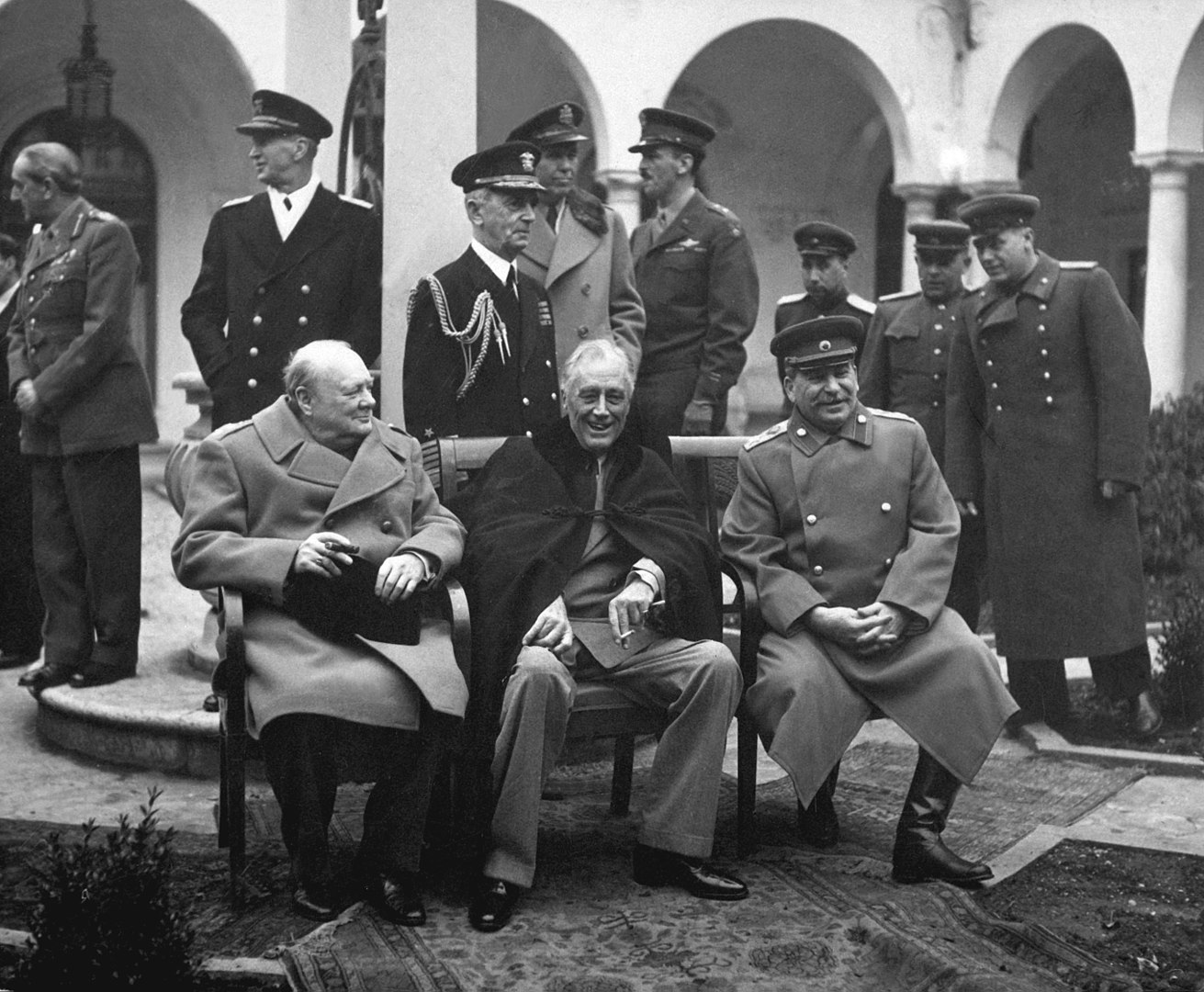
Winston Churchill, Franklin Roosevelt and Joseph Stalin meet at Yalta in February 1945 to discuss their joint occupation of Germany and plans for postwar Europe. Photo by US government photographer, Public domain, via Wikimedia Commons.
No ‘Copenhagen criteria’ were applicable here since the membership prospects were not on the agenda, and no incentives or guidance or guardianship for reforms were provided. This might be the main reason for the emergence of a developmental gap between the Balkan states and the western ‘post-Soviet’ republics that otherwise have been very similar in most terms.
The experts rarely juxtapose these two groups and even less willingly compare their positions in the early 1990s when the Balkan states actually lagged behind Belarus, Russia, Ukraine and even Moldova in most social, political and economic indices. They prefer to compare, in most cases, today’s post-Soviet eastern Europe not with the Balkan states, but with the more advanced nations of central Europe that actually held higher development rankings from the very beginning of the post-communist transformation and benefited substantially from the EU accession track.
The comparison conveniently justifies the exclusion of the post-Soviet group from the European project and, as with any circular argument, turns it ultimately into a self-fulfilling prophecy. The Balkan nations, within this civilizational teleology, were assumed to be ‘European’ – exactly like Greece long ago, hence properly assisted, and hence proven ‘European’, while the western post-Soviet republics were, conversely, assumed to be ‘non-European’, hence left in the cold and, predictably, proven ‘non-European’.
Losing the European fervour
The post-1991 developments in eastern Europe seem to dismiss Kundera’s exclusivist and, implicitly, supremacist concept in two different ways. On the one hand, the most advanced postcommunist states, Poland and Hungary – two epitomes of the very idea of ‘central Europeanness’ – have apparently lost their ‘European’ fervour and undergone what observers believe is an ‘illiberal counter-revolution’.
On the other hand, the series of democratic, anti-authoritarian and, in most cases, pro-European revolutions that occurred in the post-Soviet space in the past decades prove that freedom, dignity and rule of law are universal values, and neither western nor central Europe have any monopoly on them. It might be the proper time, when observing the democratic upheaval in Belarus, to recollect the old Norman Davies dictum:
Eastern Europe is no less European for being poor, or undeveloped, or ruled by tyrants. In many ways, thanks to its deprivations, it has become more European, more attached to the values which affluent Westerners can take for granted.
The destruction of the Berlin Wall was just the beginning of a long and painstaking process. There are many more walls in eastern Europe and elsewhere still to be dismantled.
This article was first published in Ukrainian by Eurozine’s partner journal, Krytyka. Their 11-12/2020 issue looks into literature of the Maidan revolution, Soviet orientalism, and more. Read our review here.
The English version of this article was originally published in Aspen Review no. 1, 2021 and is republished by Eurozine with consent.
